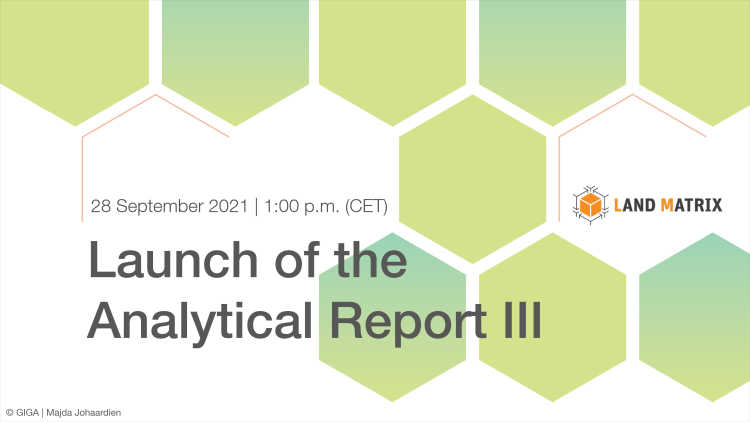- Startseite
- Forschung & Transfer
- Forschungsprojekte
- The Land Matrix, Phase III
The Land Matrix, Phase III
The Land Matrix Initiative (LMI) is a global and independent initiative that monitors competition over land use in the Global South. Its goal is to facilitate an open development community of citizens, researchers, policy-makers, and technology specialists to promote transparency and accountability in decisions over land and large-scale land-based investment. The GIGA is a key partner in this initiative and hosts the Land Matrix Database. The third phase of the Land Matrix aims at upscaling the use and generation of its data at different levels and across different stakeholder categories.
BMZ, EU, DEZA, 2019-2023
Forschungsfragen
LSLA affect how rural societies and economies function, the environmental services on which rural and urban populations depend, and global biodiversity. While many people are affected in some way, those most affected are local land users. Evidence to date suggests that where there are costs to be borne, they weigh heaviest on those who can least afford them, i.e. local land users whose livelihoods are most precarious. Yet, despite the empirical evidence of negative impacts for local populations in a high proportion of investments, this does not need to be an unavoidable outcome. Positive local effects can be observed in some cases: for example, the infusion of capital, improved infrastructure, and the creation of wage employment opportunities and infrastructure. Smallholders may also benefit from technological spillovers. Evidence suggests that the participation of local people in decisionmaking is a strong factor in realising the potential of positive investments. During this third phase, the LMI focuses on impact assessments of LSLA and policy implications.
Beitrag zu internationaler Forschung
In the third phase, the LMI proposes to upscale the use and generation of its data at different levels and across different stakeholder categories to contribute to transparent and inclusive decisions over land. This requires, first, to develop further the basis for evidence-informed decisions through improvements in scope and quality of data collection and strengthened efforts in research (analysis and interpretation of data). Second, the LMI will more actively contribute with reliable and relevant data to policy processes at global, regional level, as well as national levels. Third, the LMI as a decentralised network will invest in better coordination of its activities from data production to communication.
Forschungsdesign und Methoden
The project aims at two specific objectives (outcomes):
1. Governments, development agencies, businesses, NGOs, researchers and land users (including smallholders, pastoralists, women, ethnic minorities CSOs) access and use reliable and relevant data, information and analyses on LSLA contributing to evidence based decision making as well as monitoring of impacts of LSLAs.
2. Targeted inputs at regional and national level based on data and information on LSLAs (domestic and international) to multi-stakeholder processes around land are used, hereby supporting the participation of relatively weaker stakeholders (smallholders, pastoralists, women, ethnic minorities CSOs) in such processes.
Vorläufige Ergebnisse
Preliminary findings show the need for more responsible land investments in targeted lower- and middle-income countries, but land deals remain opaque. There is a necessity of mandatory due diligence in global supply chains. As an important, quicker, and more feasible step, the global policies (such as G20) should commit to increasing transparency by (1) supporting transparency initiatives, (2) making contracts publicly available, and (3) encouraging companies to release relevant information. Open data can then be used by relevant stakeholders to hold investors accountable.



